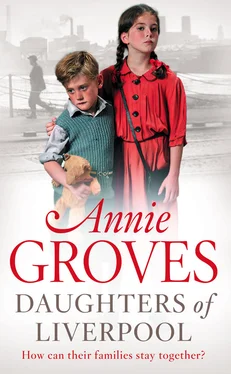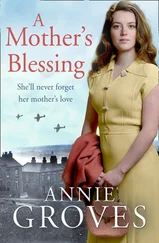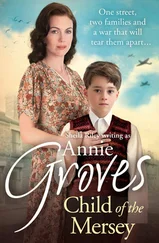Luke had changed so much since the outbreak of war, Jean acknowledged as she waved him off. Sam was tall and broad-shouldered, but Luke was now both taller and broader than his dad, his boyishness stripped from him by the experience of war.
More than anything else she wanted this war to be over and her children kept safe, but Churchill had warned them that they were in it for the long haul. Jean shivered at the thought. She should be counting her blessings, she scolded herself. Her children were all safe and well, and here in Liverpool where she could see them, and put her arms round them to reassure herself that they were safe. Unlike some. She didn’t need to look at the damage the Luftwaffe’s bombs had caused in the city to remind herself of the cost in human suffering of this war.
Her ten-year-old nephew Jack, legally the son of her twin, Vi, but in reality the illegitimate child of their younger sister, Francine, had been killed outright when a bomb had been dropped on the Welsh farmhouse to which he had been evacuated.
Sadness clouded Jean’s eyes as she set about wiping the already immaculately clean oven, before refilling the kettle ready to put it on the boil when her family started to arrive home.
Unlike some housewives, at Sam’s insistence Jean did not wear a scarf over her shiny brown curls when she was doing her housework.
‘You’ve got a lovely head of curls,’ Sam had told her gruffly the one and only time she had attempted to cover them inside the house. ‘One of the first things I noticed about you, them curls and that smile of yours.’
Jean paused in her cleaning, a tender smile curling her mouth. She’d been so lucky in her husband and her marriage. She started to hum softly under her breath, and then stopped, her smile fading, remembering how Francine had always sung around the house as a young girl.
Poor Francine. Vi hadn’t been pleased at all when their younger sister had returned to Liverpool from Hollywood, where she had been living and working as a singer, since she had left England in disgrace after giving birth to her child.
Vi had been even less pleased when Fran had started to question the way in which Vi and Edwin had been treating the little boy they had vowed to bring up as though he were their own. Jean suspected that Fran had been within a heartbeat of really throwing the fat into the fire and insisting that she wanted to take Jack back and bring him up with a proper mother’s love, when the poor little lad had been killed.
Jean’s heart ached for her younger sister. Poor Fran had been more misled and deceived than bad, and only sixteen when she had given birth to Jack. In many ways Jean blamed herself for the unhappiness both Fran and her son had endured. If she herself hadn’t been so poorly at that time she would have been able to do more and would have taken Fran’s baby on herself.
Fran was in London now, having volunteered for ENSA, the group of performers who entertained the troops. She had written to Jean to tell her that she would be working over Christmas but that she wasn’t allowed to say where.
That must mean she’s overseas, Jean guessed.
Much as she loved her younger sister and felt sorry for her, in some ways Jean was relieved that Fran wouldn’t be able to spend Christmas with them.
Her own twin daughters were going through a phase when all they wanted was to go on the stage themselves, and having their glamorous Auntie Fran around, talking about the shows she was going to be in, wasn’t really what Jean wanted them to hear at the moment, especially not when Fran herself had already said that she thought their dancing was good enough to get them on stage.
Sam, who could be protectively strict with his children if he thought it necessary, would never entertain the idea of them going on stage, especially not with there being a war on, and all sorts of men likely to be ogling every girl they saw dancing around in a skimpy costume.
Thinking of the twins made Jean hope that their billetee wouldn’t be too put out by the noise the pair of them made with their gramophone records and their dancing. The nice young woman who had come to see her about her spare room had told her that her boss – ‘Mac,’ she had called him, explaining that his real title was ‘Officer Commanding Beds’– would be thrilled to have such a clean bedroom in what was obviously a very well-run home, to add to his list of billets.
‘Flannelling you, she was,’ Sam had laughed when Jean had reported this comment to him later.
‘No such thing,’ Jean had insisted firmly. ‘She was telling me that some of the rooms she’d been to see weren’t fit to house an animal, never mind a decent young woman.’
Vi had, of course, sniffed disparagingly on being told that Jean was to have someone billeted on her, announcing that she would never be able to let some stranger sleep in one of her own beds. By rights Vi, with her three empty bedrooms now that her son and daughter had left home, should have put her name down for billetees but with Edwin on the local council she had boasted to Jean that she had managed to avoid doing so.
‘Just look at the situation at Bella’s,’ Vi had told Jean crossly, at the service for those who had lost their lives in the same bomb that had killed Bella’s husband and his parents. ‘Newly widowed and still having to have living with her those Polish refugees she was forced to take in. Not just one of them either, Jean,’ Vi had complained bitterly. ‘There’s the mother and the daughter, both of them adults and eating their heads off, and the mother’s got that son of hers expecting to stay at Bella’s whenever he comes to visit.’
Privately Jean’s sympathies lay with her niece’s billetees, who, from what she had learned of them on the single occasion she had met them, had seemed very pleasant, especially the son, Jan, who was in the air force and had taken part in the Battle of Britain.
There was no denying that her sister was a snob and a social climber, Jean admitted now, as she went back to her cleaning, rubbing fiercely at the kitchen sink taps. The war meant it was getting harder now to buy proper cleaning things. Not that Jean would ever waste her money on fancy cleaning stuff when a bit of a wipe with vinegar could do the job just as well.
Vi’s snobbery didn’t seem to have brought her any happiness so far as Jean could see. Even as a child Vi had been one of those people who was never satisfied or happy, unless she was sure that she had the best of things, and could look down on others, and she was just the same now.
* * *
‘Have we got time to walk home past the Royal Court Theatre, do you think?’ Lou asked her twin sister, Sasha.
Sasha shook her head. ‘Better not. Mum will only start asking us why we’re late and where we’ve bin, you know what she’s like. It’s a pity that Auntie Fran has gone to London. If she was still here she’d have bin able to work on Mum for us and help us to get some stage work, p’haps in one of the Christmas pantos. After all, she said we were good enough.’
The twins exchanged disappointed looks. They were, as Jean herself often said, as alike as two peas in a pod with no one really able to tell the difference between them unless they themselves allowed that to be seen.
At fifteen they were in many ways young for their age, still very much ‘schoolgirls’, with their plaits and freckles and their giggles. But that outward youthfulness hid a shared fierce determination to follow their auntie Fran onto the stage, along with an awareness of how strongly their parents would oppose that ambition.
The jobs they would be going into in Lewis’s department store after Christmas – proper jobs with proper wages, not just the bits of work they had been doing running errands for Mrs Lucas, the elderly owner of the old-fashioned dress shop in the city centre, which was closing down after Christmas – showed what their parents wanted for them: safe steady jobs that would keep them at home until the time came for them to marry. But the twins had other ideas and dreams, which had become all the more compelling with the onset of war and their auntie Fran’s recent visit.
Читать дальше












